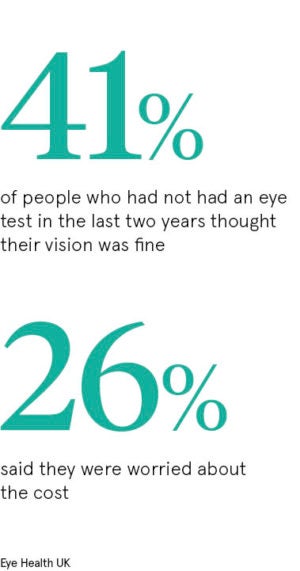The strange thing about eyesight is that, although we’re all intuitively aware of its importance as one of our major senses, too many of us don’t do enough to protect it and avoid eye conditions that could damage our quality of life and, in some cases, even lead to blindness.
So much can and should be done to inform and educate the public about eye health. Politicians, the NHS and others are struggling with the challenge of managing our ageing population. As more people are living longer it’s important for us as individuals and for society as a whole that we can live independent lives for as long as possible. Ensuring people have good vision and healthy eyes as they age is essential to achieve this goal.
And yet if you look at the Public Health England website and other sources of health information you’ll find lots of information about issues such as obesity, children’s teeth and smoking cessation, but there’s very little if anything about eye health. Some easily understood points about the importance of eye health and some tips and advice on how to maintain healthy eyes could be incredibly useful.
Not caring for your eye health poses considerable risks
Looking after your eyes has health benefits beyond just how well you can see. It can help you consider your diet and quit smoking. Regular eye checks can also spot signs of poor health, including high cholesterol and increased risk of a stroke.

There’s growing evidence of an increase in short-sightedness, myopia, among younger people. This might well be associated with the fact that children, millennials and others don’t spend enough time outdoors. It’s sometimes thought that if you are short-sighted you just need to get some glasses and you’ve solved the problem. However, myopia can be a risk factor for other eye conditions later in life and so it needs to be treated seriously.
There are a number of reasons why not enough of us go for regular eye tests. It’s sometimes said, for instance, that people are worried about the cost of spectacles. In fact many of us don’t need them and even those who do can pick them up very cheaply. A significant proportion of the population are eligible for free glasses and even those who pay can pick up a perfectly good pair starting at about £25. It’s a relatively small amount of money but it can bring such a huge benefit in return.
Looking after your eyes doesn’t need to be difficult
Opticians are usually open six and in some cases seven days a week and they need to remind people of how easy and accessible they are. An eye examination might cost around £20, but we need to point out that this is a detailed examination with a highly trained healthcare professional using a lot of advanced technology. And many people, including those over 60 and children, are exempt from paying.
Perhaps we need to think about our language here. An eye “examination” or “test” sounds like something you could fail. Instead, perhaps we should emphasise the health aspect. After all, whenever I carry out a consultation, less time is spent on testing a patient’s sight with the majority of the time spent checking the health of the eyes and giving advice. An eye health check-up might sound more appealing to consumers.
We all need to do more to ensure that everyone takes better care of their eyes. The cost to the NHS and social services caring for those with low or no vision, and the loss to the economy of those who can’t work because of sight problems, is enormous. Investing money and resources in the nation’s eye care will bring about huge returns. National Eye Health Week is the ideal time for all of us to take action.
Not caring for your eye health poses considerable risks

